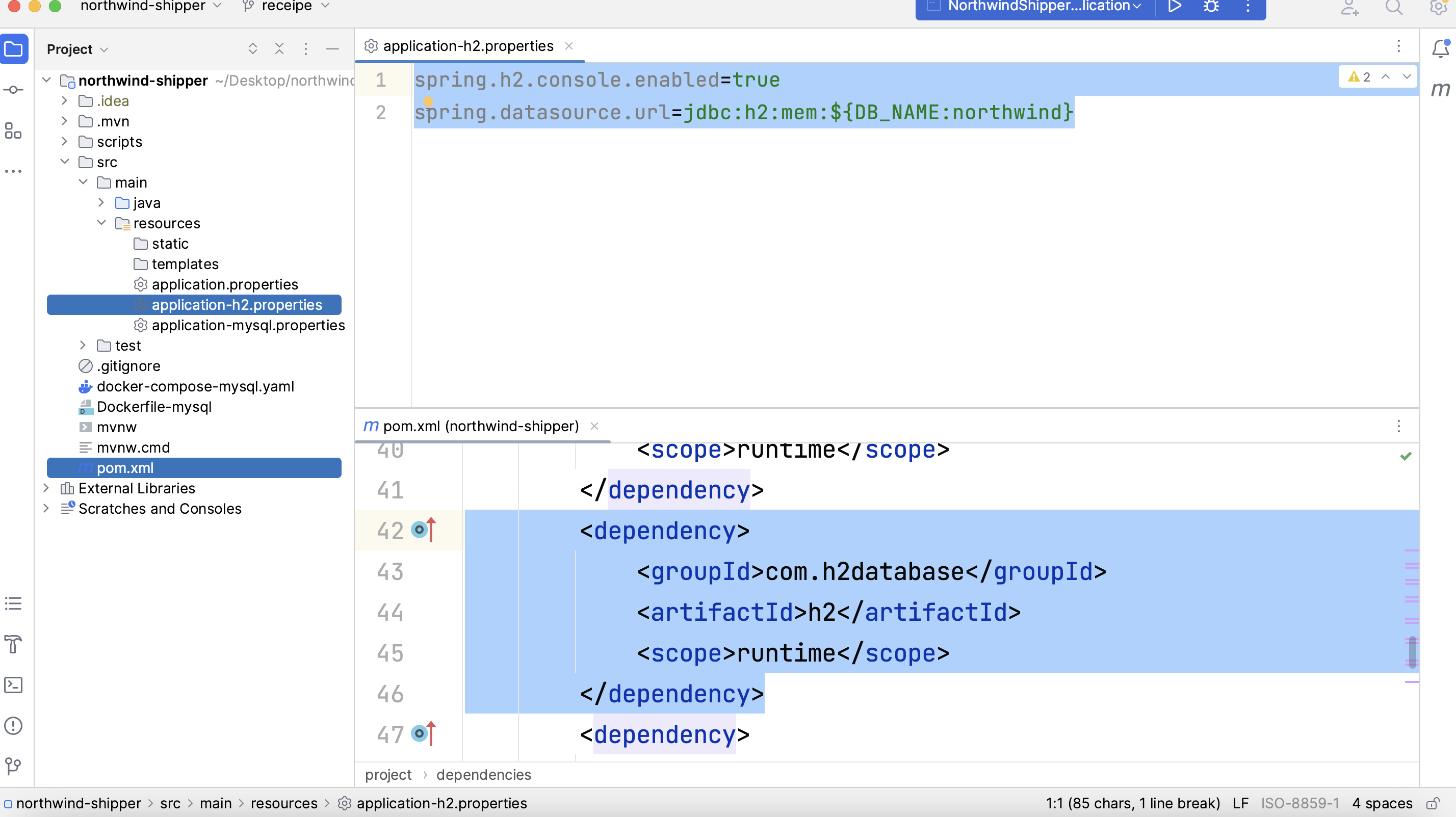Step 11 - H2 test DB
The Goal
Add H2 config
- After this step, your Spring Boot app will be able to connect to one of 2 databases:
- MySQL
- profile: 'mysql'
- local instance or Docker container
- you are responsible for the database config
- H2
- profile: 'h2'
- in-memory database
- Spring will do everything for you
- MySQL
+-------------+ +-------------------+ +---------------+
| SpringBoot | | Datasource_MySQL | | Datasource_H2 |
+-------------+ +-------------------+ +---------------+
| | ----------------------\ |
| |-| A local instance or | |
| | | Docker container: | |
| | | your job | | ---------------------------\
| | |---------------------| |-| Spring's job |
| | | |--------------------------|
| | |
| profile: mysql | |
|------------------------->| |
| | |
| profile: h2 | |
|--------------------------------------------------------->|
| | |
Starter code
The updated files after this step

TODO
Update pom.xml: add h2 dependency
<?xml version="1.0" encoding="UTF-8"?>
<project xmlns="http://maven.apache.org/POM/4.0.0" xmlns:xsi="http://www.w3.org/2001/XMLSchema-instance"
xsi:schemaLocation="http://maven.apache.org/POM/4.0.0 https://maven.apache.org/xsd/maven-4.0.0.xsd">
<modelVersion>4.0.0</modelVersion>
<parent>
<groupId>org.springframework.boot</groupId>
<artifactId>spring-boot-starter-parent</artifactId>
<version>3.0.2</version>
<relativePath/> <!-- lookup parent from repository -->
</parent>
<groupId>com.example</groupId>
<artifactId>northwind-shipper</artifactId>
<version>0.0.1-SNAPSHOT</version>
<name>northwind-shipper</name>
<description>Demo project for Spring Boot</description>
<properties>
<java.version>17</java.version>
</properties>
<dependencies>
<dependency>
<groupId>org.springframework.boot</groupId>
<artifactId>spring-boot-starter-data-jpa</artifactId>
</dependency>
<dependency>
<groupId>org.springframework.boot</groupId>
<artifactId>spring-boot-starter-validation</artifactId>
</dependency>
<dependency>
<groupId>org.springframework.boot</groupId>
<artifactId>spring-boot-starter-web</artifactId>
</dependency>
<dependency>
<groupId>org.springdoc</groupId>
<artifactId>springdoc-openapi-starter-webmvc-ui</artifactId>
<version>2.0.2</version>
</dependency>
<dependency>
<groupId>com.mysql</groupId>
<artifactId>mysql-connector-j</artifactId>
<scope>runtime</scope>
</dependency>
<dependency>
<groupId>com.h2database</groupId>
<artifactId>h2</artifactId>
<scope>runtime</scope>
</dependency>
<dependency>
<groupId>org.springframework.boot</groupId>
<artifactId>spring-boot-starter-test</artifactId>
<scope>test</scope>
</dependency>
</dependencies>
<build>
<plugins>
<plugin>
<groupId>org.springframework.boot</groupId>
<artifactId>spring-boot-maven-plugin</artifactId>
</plugin>
</plugins>
</build>
</project>
Update pom.xml: create application-h2.properties
spring.h2.console.enabled=true
spring.datasource.url=jdbc:h2:mem:${DB_NAME:northwind}
The Glossary
H2
H2 is a lightweight, in-memory database used in Spring applications for development, testing, and prototyping purposes.
Spring Boot provides built-in support for H2, allowing developers to quickly and easily configure and use it as a database for their applications. H2 can be used as an embedded database, which means that it can run within the application and be automatically created and destroyed as needed, or it can be used as a standalone database that runs separately from the application.
Using H2 in Spring allows developers to quickly prototype and test their applications without the need for a full-fledged database system, and it provides a convenient and flexible way to store and retrieve data in various scenarios.